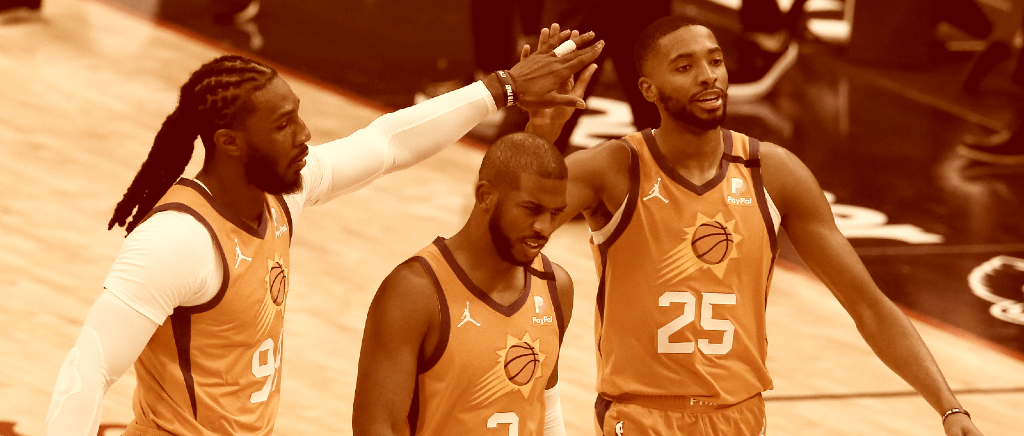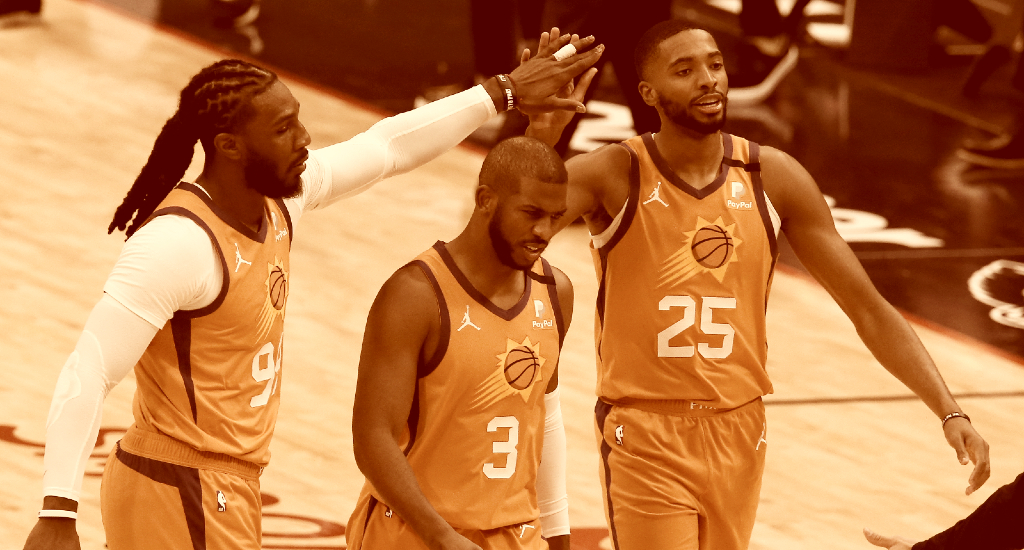
Last year’s Phoenix Suns didn’t come out of nowhere, but it sure felt like it. When Game 1 of the 2021 NBA Finals tipped off, Devin Booker was the only person from the coaching staff or roster who had been in Phoenix prior to 2019. Their rise was fast, but after surging to a 25-5 start this season, there’s no more doubting it. If rival NBA teams can take anything away from this quick catapult to the top of the league, it’s how competency can make middling teams good, and good teams great.
For James Jones, it was no accident. When he took over as general manager in 2019, he told reporters, “We need to add guys in their prime. We need to raise the floor of our team. And you only do that with NBA players – not prospects, but NBA players. So, we’ll focus on acquiring those guys via all the channels we can.” In the next 18 months, Jones would trade for Dario Saric, draft a 23-year-old Cameron Johnson, sign Ricky Rubio, trade for Chris Paul, sign Jae Crowder, and trade for Torrey Craig. Having better players up and down a roster makes it harder for a team to lose, but the Suns had spent years losing, eroding away anything approaching a foundation. For Jones, the additions of Rubio, Paul, and Crowder, in particular, helped lay a foundation of competency and professionalism, which was desperately needed in order to get the Suns’ young core get to the next level.
Jones isn’t the first GM to see this dynamic play out on his team, though he may have been more aggressive in pursuing it. The Suns also aren’t the only NBA team that has seen competency pay off in recent years. Across the league, a premium has been placed on being good as soon as possible due to evened-out lottery odds, increased star movement, and players using their leverage over teams earlier in their careers.
As the NBA says goodbye to an era in the late 2010s in which seemingly a half-dozen teams entered every season prepared to tank, one can argue the Suns were one of the teams that showed the perils of pursuing that model without the requisite level of patience and franchise-wide buy-in. When Ryan McDonough was running the franchise and shooting for high lottery picks every year, Suns fans learned quickly the pain of half-heartedly tanking. One year the Suns might bench Eric Bledsoe during a career-best year in the name of losing, but then turn around and give Trevor Ariza nearly $20 million in free agency a couple years later. Without top-down buy-in, tanking does not work, and getting an organization from ownership through the coaching staff on board is a difficult task.
That’s especially the case now. Because the three worst teams in the NBA all getting an equal shot at the No. 1 overall pick (14 percent) due to lottery rule changes, it hardly makes sense to set your team up for failure for too long. That’s why in 2021, Orlando and Oklahoma City are the only franchises that don’t seem to care about winning all the much. Fellow bottom-dwellers Houston and Detroit are playing their veterans or at the very least empowering young players to develop, and even the Thunder and Magic have been competitive for stretches when they’ve been healthy.
As the franchise decided to prioritize bringing in players who raised their floor over continuously swinging high in the lottery, the Suns reinforced another lesson in the NBA. As we saw in the summer of 2019 when Kawhi Leonard chose the Clippers and the Kevin Durant-Kyrie Irving package went to Brooklyn, being an appealing market helps, but it’s not enough to woo superstars anymore.
When Durant got to Brooklyn, he explained that the Nets’ continuity, player development, and winning culture appealed to him. Playing near home was a big factor for Leonard, and teaming up with Paul George was clearly appealing, but it’s hard to imagine that being enough if not for the Clippers’ track record of winning in years leading up to his free agency. The Clippers can thank the Lob City stars for that, but even as they transitioned out of the Lob City era, they remained competitive even without much in the way of superstar talent.
Likewise, this Suns team can thank Rubio, Aron Baynes, and even Kelly Oubre Jr. Those are the guys who helped pull the Suns out of the black hole they were facing down, bringing the Suns’ young core along with them, and ultimately opening up a window for the team to go 8-0 in the Orlando Bubble, attract the attention of Chris Paul, and make way for a Finals run.
The Suns weren’t the only team in last year’s playoffs who benefited from embracing competency. Atlanta, pushed by an ownership mandate and pressure from All-Star point guard Trae Young, added veteran talent in the form of Clint Capela, Danilo Gallinari, and Bogdan Bogdanovic en route to a conference finals berth. The Knicks, beaten down after missing out on Leonard and Durant, turned to a floor-raising coach in Tom Thibodeau and got important contributions from players like Alec Burks, Reggie Bullock, and Nerlens Noel to earn the 4-seed in the East after years out of the postseason.
In Atlanta, New York, and Phoenix, competent players not only helped insulate the team from mistakes and inefficiency, but helped develop young players as well. The impact Paul has had on Deandre Ayton and Mikal Bridges is obvious in Phoenix, with both turning in career seasons this year. The same is true for Young, who doesn’t have to worry as much about being swallowed up by opposing defenses with better talent around him. Elsewhere in Atlanta, players like Kevin Heurter, De’Andre Hunter, and Cam Reddish could settle into roles that suited them well rather than being dropped onto a bad team that they were expected to help fix. Even Knicks forward Obi Toppin has had a promising second season so far in Thibodeau’s veteran-laden second unit, a season after rookie Immanuel Quickley was the talk of Manhattan.
This year, it’s the Cleveland Cavaliers and Chicago Bulls making leaps thanks to investing in floor-raisers this offseason. The Bulls almost completely revamped their roster in the course of 12 months, eschewing a slow rebuild in an effort to get Zach LaVine to buy in long-term by showing they believed in him enough to make a real effort to build a contender. Chicago traded for Nikola Vucevic, signed-and-traded for DeMar DeRozan and Lonzo Ball, and added Alex Caruso to bolster a roster that has them in the top half of the East. In Cleveland, it was savvy acquisitions of the likes of Jarrett Allen and, once again, Rubio playing the role of steady hand alongside some breakout youngsters in Darius Garland and Evan Mobley.
NBA minds love to copy one another, especially the best teams, and structural changes like lottery reform have pushed execs to adjust their philosophies as well. Still, common assumptions about how to build teams have come a long way in a short time. When Jones came out swinging for the middle rather than betting on ping-pong balls, he was lampooned. This was a time when “the treadmill of mediocrity” was a phrase that NBA fans who were read-up would throw out to prove why losing was always the right answer.
If you’re going to operate like Process architect Sam Hinkie or Thunder GM Sam Presti, it requires a full commitment from ownership throughout the organization. But when faced with the realities of keeping fans engaged, building a culture, and being an attractive place for the best players and coaches, it can’t be permanent. A leap up has to come eventually, and different team dynamics mean that moment will arrive differently city to city.
But in an NBA that has increasingly seen even teenage stars wielding influence over management, the window for building around a young star has shrunk considerably. No longer is it an 7- or 8-year project to prove to a young standout they should stick around for a third contract. It starts in year two or three now, and teams are starting to recognize the value in a quicker leap to competitiveness, because keeping those guys is a bear, and winning seems to be the best way to do it, no matter what city you reside in.
The league knew it had a problem during the tanking era, but teams knew it, too. Most weren’t committed to it, not fully. The Suns sure weren’t. Competency suited them better, and others are finding the same.

